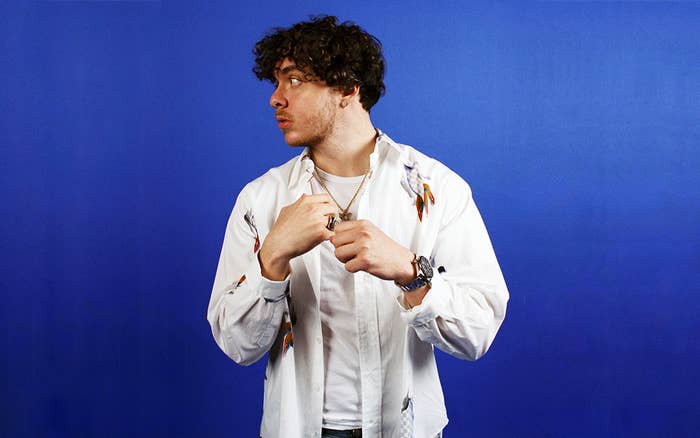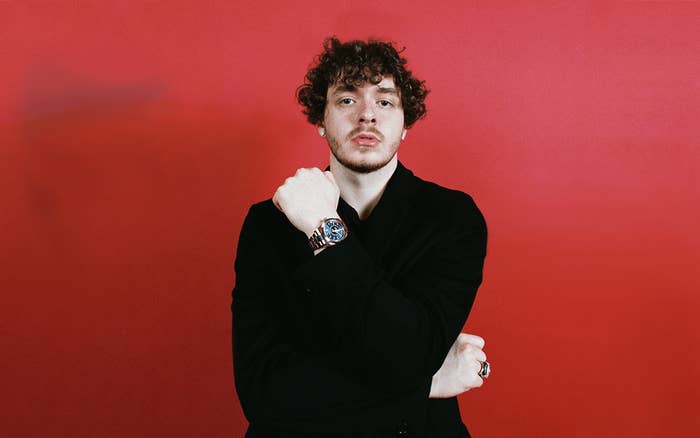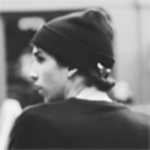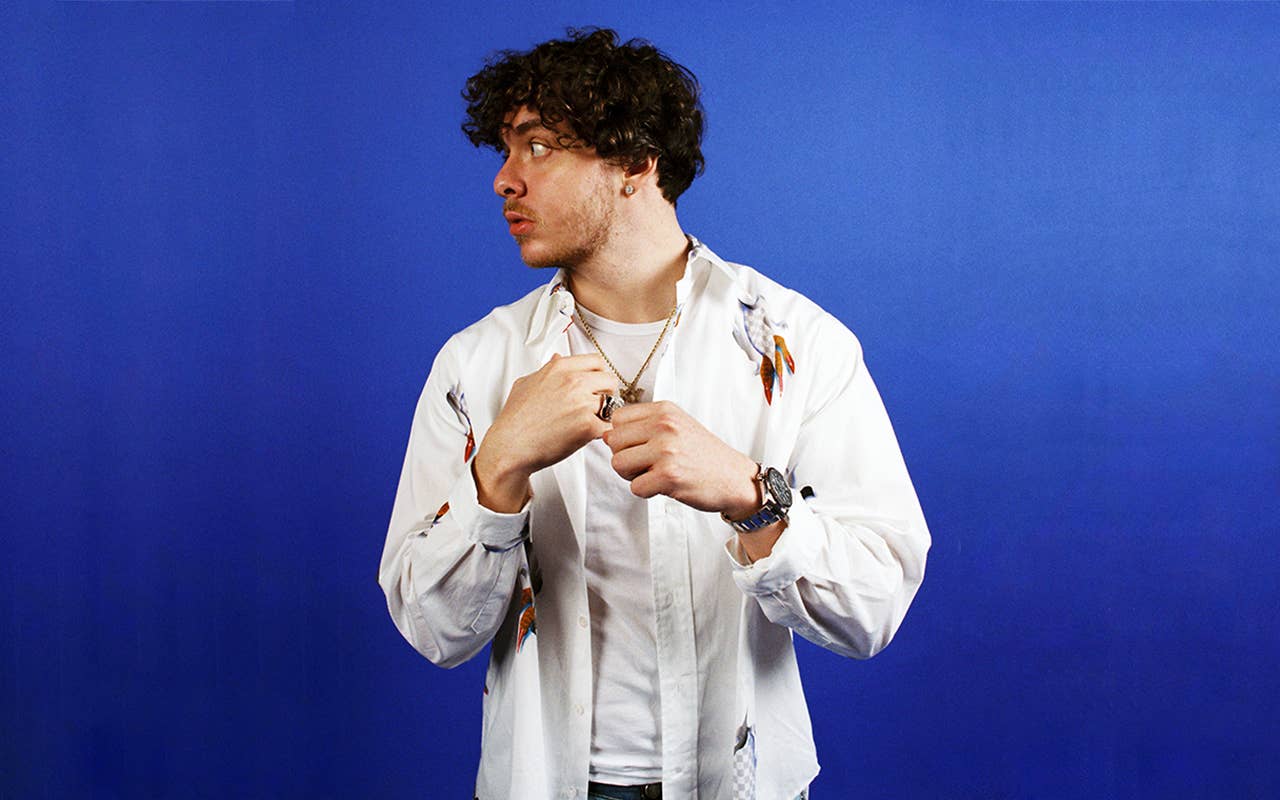
Twenty-four hours before the release of his debut studio album, Jack Harlow joins my Zoom call and immediately apologizes for being five minutes late.
Noticeably tired from a long day of press, but in a relatively good mood, he graciously answers questions about the ups and downs of his breakout year. And by the midway point of our conversation, one thing becomes very clear: Jack Harlow is extremely self-aware. He's heard the white rapper jokes. He's read the internet comments, and he's cognizant of the evolving narratives about himself. But he hasn't let any of it shake his confidence.
"I'm in the business of turning skeptics to believers," he says, point-blank.
So far, it's working. His three-times platinum single "Whats Poppin" became one of the biggest rap songs of 2020. Then he followed it up with another hit in late October, "Tyler Herro," which has already tallied over 100 million streams. Along the way, he's managed to change the minds of many doubters. If you look in the comments under any of his music videos, you'll see a healthy dose of messages that read somewhere along the lines of: "Whoa, this guy can actually rap."
Now, with the release of his new album, appropriately titled That's What They All Say, Harlow wants to prove even more people wrong. "I think people right now have me boxed in as the white boy who can really rap," he says. So, throughout the 15-song tracklist, he's playing with melody more and pushing himself into new musical territory.
Celebrating the release of the album with an appearance on the final night of ComplexLand, Harlow hints he has a couple new tricks up his sleeve when it comes to live performances, too. Before taking the virtual stage at 8:30 p.m. (watch it for free right here) Harlow caught up with Complex for a conversation about the new album, making music with Lil Baby, and more. The interview, lightly edited and condensed for clarity, is below.

You're about to headline the final night of ComplexLand. What can fans expect?
The performance involves some choreography and some sets that I've never done before. It's fun challenging myself in that way, and fans are going to see me perform in a fashion they haven't seen me perform yet. I can't lie.
You're opening the performance with "Tyler Herro." Where'd the concept for that song come from?
That was one of the first five songs I wrote when we went into quarantine. I was powered up about seeing what some white guy on the internet had written about me, so it fueled me and I was feeling a way. And I had just become cool with Tyler Herro at that time. We had been talking, and I named-dropped him in the song when I recorded it. Fast forward to the moment he had in the playoffs, and we ended up just naming it after him. By that point, me and him had actually formed a real friendship, so it just felt right.
What was Tyler's reaction the first time you played him the song?
Man, he was at practice and he saw the name of the song in his messages. He literally stopped practicing to go listen on his phone when I texted it to him. He was loving it. I think just seeing the name pop up in his messages was enough for him to stop everything he was doing and hear it. If you watch the scenes with me and him in the video, he's rapping along. He knows every word. I remember I was at the shoot and I was like, "Yo, if you know any of the words, rap with me." He's like, "Boy, I know every word." [Laughs.]
When that song was announced, there were some jokes, like, "Oh, of course this white rapper made a song about a white basketball player." But it seems like you're self-aware about everything. What do you think about some of those responses?
It didn't bother me too much. I always know there's going to be a response. A response is better than no response. I knew there were going to be some comments like that, but I just let the music speak and the raps speak. The song is undeniable. It's just one of them records.
I've seen you turn a lot of doubters into fans this year. How do you think you've been able to do that?
I think authenticity resonates with people. I think people believe me and people can tell that I'm secure in myself. I've been doing that my whole life. I was rapping in high school and there were kids that used to hate on me, who show me a lot of love now. I'm in the business of turning skeptics to believers. It's something I'll always be confident that I can do. And it makes it easier to really not sweat about anything anyone's saying about me, because I know anyone could become a fan of me.
I see the exact same thing you're seeing this year. After a while, it's going to be undeniable, though. You see the greats. That's what they do. There was a point where it was really trendy to hate LeBron James, and then he hit a turning point when he won that championship in Cleveland, after being down 3-1. The cultural consensus had turned to, "Well, you've just got to respect him." The tides had turned and it wasn't wavy to hate LeBron anymore. Same thing with Drake. I think Drake has crossed that line now where it's like, all right, it's kind of lame if you just hate Drake at this point. So when I see the greats do it, I know I can do the same.
What do you think is the biggest misconception people have about you right now?
I think people are unaware of my musical range, and that's something about this album I'm excited about. I'm really excited to show that off. I haven't had a real melodic record hit big for me, and melody is a big part of what I do. I'm very musical and groovy in general. I think people right now have me boxed in as the white boy who can really rap. That's cool, and I'm always going to do the rap thing, but I'm excited for more of my music to spread its wings and get credit for that breadth and that range.
You joke around a lot, especially on social media. Do you think people don't get the joke sometimes and think you’re serious about everything?
On social media, yeah. But I'm kind of at peace with that. That's kind of why I enjoy it.
What did you set out to prove when you made this album?
Injecting some substance into this album was really important to me. I see what everyone says about me. I'm narcissistic enough to find out. But it doesn't bother me like it did when I was younger. And for me, it's what we've been talking about in this conversation: proving people wrong and showing my range. Even outside of rapping, I never wanted to be pigeonholed. I dress a certain way. I move a certain way. A lot of it's subconscious, but it's because I don't want anyone to be able to put me in a category. I want to be limitless in every way. That's what this album is about. You can't put me in a box. I can't be pigeonholed.
Why did you name the album That's What They All Say?
I've heard it all before. I've heard every comment you could possibly make about me at this point. It's a response to all that. "Yeah, I've heard it. I got you. It's old news. That's what they all say."
There's a song on here called "Face of My City" featuring Lil Baby. How'd that come together?
I was in the studio one night with Sonny Digital. He played this beat and it was rocking. So I just went into the booth and I didn't think too much on it. I did the hook and freestyled the verses. I punched them in. I was just rapping. It was just an exercise. I liked it, but I was like, "I don't know if it's album-worthy or not." I had to sit with it. Then I sent it to Don Cannon. He was like, "Whoa." I didn't really have any rap records on the album like this yet. Like, stank face, dirty rap records. He's like, "You need to put Lil Baby on this."
Since I've been moving around Atlanta for the last few years and going to the clubs and events, I run into Lil Baby periodically. Every time, it's been love—more than I could've anticipated. That's in his character. He's always dapped me up and said, "Yo, keep going. You got it. You're going to be that." I've always looked at him in a really great light because of that, because of the way he's treated me. So to finally line this one up, it's perfect.
The song is called "Face of My City," and you rep Louisville, of course, but you've also been spending a lot of time in Atlanta. Are both cities home at this point?
Louisville's always home. That's my city. But Atlanta has been a good workspace for me, and I've been able to grow a lot down here, just being around other artists and being around work ethics and being in the industry. It was good for me to come down here and force myself to work and get better. I wasn't freestyling and I wasn't punching in until I got down here. All the artists down here, they freestyle. So it forced me to step it up.
In the trailer for the album, you say you hope it's remembered as a classic. What are the traits of a classic album to you? And why do you think this could qualify as a classic down the road?
To me, it's music that the culture digests all at the same time, on a decently mass level. Everyone kind of gets a chance to feel it and anticipate it. And then secondly, the music ages well, and it's timeless. I just have a good feeling about this music aging well.
In the trailer, you also say this is the first album where you feel like a man, and you felt like a boy before. What's different this time?
When I was young—and I talk about this with my engineer sometimes—a lot of the songs had this tone of, like, "Look at what I can do. I'm boy wonder. I'm this young kid that's popping my shit. Look at these flows." And I've kind of grown out of that space. I try to make music that isn't just about me. Sometimes great music doesn't have to just be about, "Look how great I am." This is grown music. This is adult music. And I think my voice has really settled into this manlier space. I listen to interviews and music from the last two years and I literally can hear my voice is a little deeper, a little more seasoned. So this album just feels like manhood.
This week, you dropped a single called "Way Out" with Big Sean. What's the story behind that?
I always say some of the greatest songs come together quickly. I thought of the chorus for "Way Out" in about five minutes and I didn't think much of it. When I came into the studio the next day, my engineer pressed the space bar and played the melody I did. I was like, "What is this" I didn't even remember it, but it sounded amazing the next day. That's just how it works sometimes. Then Big Sean reached out to me after I dropped "Tyler Herro" a couple months ago and showed me respect and love. I'd been holding onto "Way Out" since early this year, so I sent it to him. Then I went to his house in L.A. and he knocked the verse out right in front of me.
How has the success of "Whats Poppin" affected you? Do you feel it’s put you under a bigger microscope of scrutiny?
Yeah, of course. I mean, all of that comes with it. It's life under the scope and I've accepted it. I knew what I was getting into. So there's pressures and there's anxieties, but there's a lot of perks, too. I just take both.
Even this week, there was momentary backlash to your album cover. How do you react to things like that?
I mean, there's blinders. I go through long periods where I'm like, "Don't search your name." I don't search my name online. There's certain things that just aren't meant to be digested. We're not supposed to know what the world thinks of us. Even at this level, it's not really healthy as a person. I know that people have opinions about me, but it's not healthy for me to know all of them. And if you go looking for them, you’re asking for it. So, aside from that, I know all the controversy ages well. All our greats have been through the controversy and have been crucified and made to be seen as a villain. And then it ages and the art speaks. So I don't trip.
I'm sure a lot of artists you admire have reached out and shared words of wisdom this year. Can you share one?
Adam Levine is a big one. He's on the album. He's been very good to me and forthcoming. We were on FaceTime the other night, talking about life and what this career brings. And he gives me game. He's just in this other space. We were talking about how being on TV, in the position he is, he can't really go to the supermarket without getting seen or somebody wanting a picture. Teenagers know who he is, and 70-year-olds know who he is. So it's a different level, and he just talked about it with me. We have some good conversations. So that's a big one for me.
What's the most important thing you want people to know about you right now?
I think if you had asked me that a year or two ago, I'd have a short list of things for you. But I've really gotten to a place where it's almost comfortable to be misunderstood a little bit. And I'm excited for the world to find out more about me, because I can see them getting to know me better, month by month, and really getting closer to having a grasp on who I want to be seen as. And all I want to be seen as is the truth. I didn't come in here with a persona. My rap name is my government name. Everything I'm doing is representing me and my father before me. It's on my name. I've never been somebody who was a wrestling character. There's no bullshit involved. So I'm okay with the misconceptions. I guess to answer your question, I don't really have anything I want to tell them. I'm just excited for them to find out. And I think they will.





